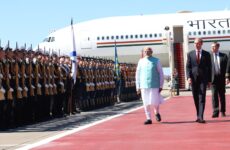Tallinn/Estonia, President Obama arrived here Wednesday morning with a singular goal: to reassure Baltic countries that the United States and NATO stands ready to defend them against Russian aggression, as Moscow ratcheted up its rhetoric against the Western alliance Tuesday.
Obama arrived in this walled medieval capital on the Baltic Sea as tensions continue to escalate in Ukraine. The Kremlin Tuesday called NATO an “external threat” to Russia and denounced Ukraine’s latest moves to join the alliance. Obama will meet with the presidents of Estonia, Latvia and Lithuania Wednesday, hoping to reassure them that the alliance stands squarely behind them in any potential confrontation with Russia.
Obama was greeted in a formal ceremony by Estonian President Toomas Hendrik Ilves at Kadriorg Palace. The two men shook hands outside on a crisp, sunny morning. A military band played the national anthems of both countries. The men greeted a group of children, one of which got a high five from Obama.
Obama signed a guest book inside the palace, where he wrote that Estonia is a nation “that shows what free people can achieve together.” The president and his national security members then met with Ilves
Obama’s meetings here, ahead of the NATO summit in Wales, hinge on a commitment by NATO countries of collective defense for its 28 members. The agreement, known as Article 5, states that if one member is attacked others will come to its aid.
“You have in Estonia a large Russian population, and therefore part of the message that the President will be sending is, ‘We stand with you; Article 5 constitutes an ironclad guarantee of your security; Russia, don’t even think about messing around in Estonia or in any of the Baltic areas in the same way that you have been messing around in Ukraine,’” Charles Kupchan, senior director for European Affairs at the National Security Council, told reporters.
Obama’s presence in the region is also meant to send a message to Russian President Vladimir Putin that the Baltics are not Ukraine.
“In Estonia, I will reaffirm our unwavering commitment to the defense of our NATO allies,” Obama said.
However, the Baltic states remain nervous given the state of affairs in Ukraine. The principle of Article 5 has taken on a whole new specter since Russia annexed Crimea earlier this year. Obama’s trip was arranged in the past few weeks as the White House blamed Russia for a “flagrant escalation” of the situation after it moved humanitarian convoys across the Russian border without Ukraine’s consent or knowledge.
“There has always been a great fear in the Baltic states that if push came to shove, they question whether NATO would really have their back,” said Heather Conley, vice president for Europe, Eurasia, and the Arctic; and director, Europe Program at the Center for Strategic and International Studies.
Estonia may be particularly exposed in Eastern Europe. Not only is Estonia a former Soviet Republic with a significant Russian-speaking minority, it is close to Finland, which has recently strengthened its ties to NATO and as a result has seen Russian military jets repeatedly violate its airspace.
“Part of the reason I’ll be going to Estonia is to let the Estonians know that we mean what we say with respect to our treaty obligations,” Obama said, as the situation with Ukraine continues to intensify.
Russia said this week it will review its military plans as NATO is expected to endorse the formation of a rapid response team of about 4,000 troops that can quickly deploy to Eastern Europe. The plan will respond to Russia’s “aggressive behavior,” NATO Secretary General Anders Fogh Rasmussen said Monday, and plans to open bases in Eastern Europe.
“Russia is intervening overtly in Ukraine,” Rasmussen said.
Obama’s time in Estonia is short, but busy; he will meet with the country’s president and prime minister, the Baltic presidents, receive a NATO briefing, meet with troops and deliver a speech to students here.
His trip here follows a visit by the Baltic presidents to the White House last summer and underscores long-standing security concerns about the region.
“The Baltics are among our most reliable allies in NATO, and our commitment to their security is rock-solid,” Obama said last year.




 Driving Naari Programme launched in Chandigarh
Driving Naari Programme launched in Chandigarh






























